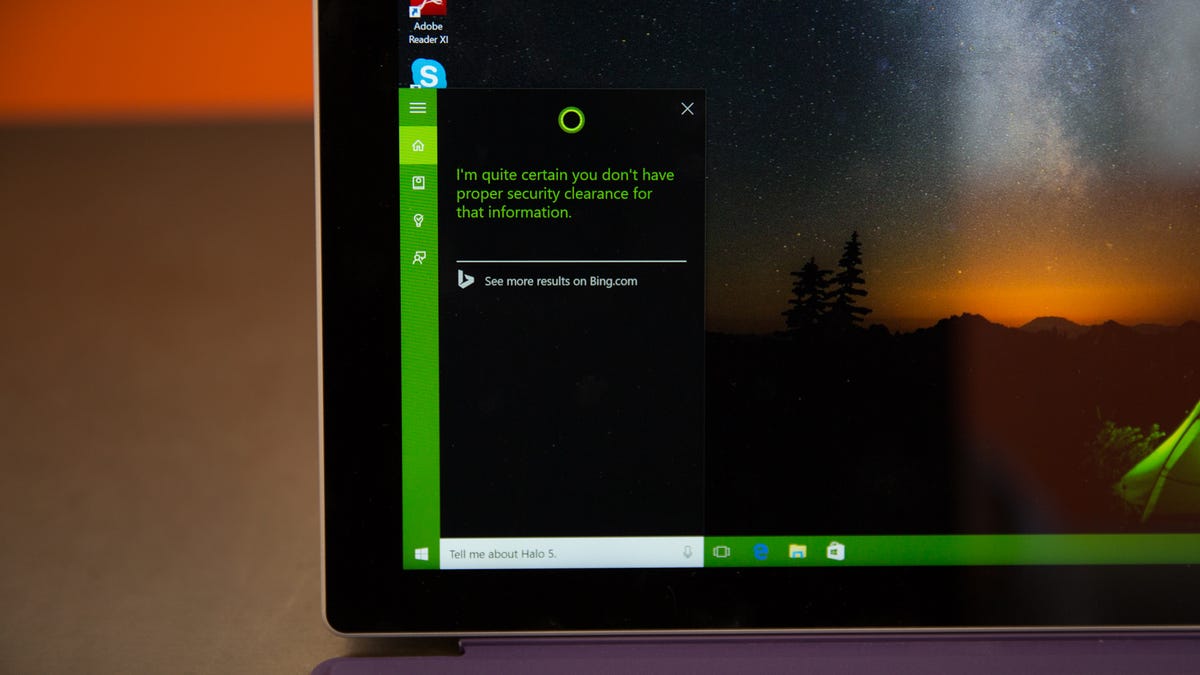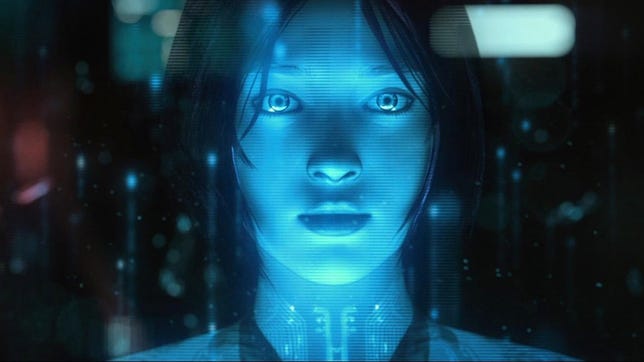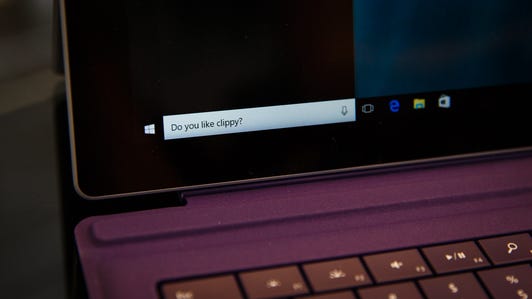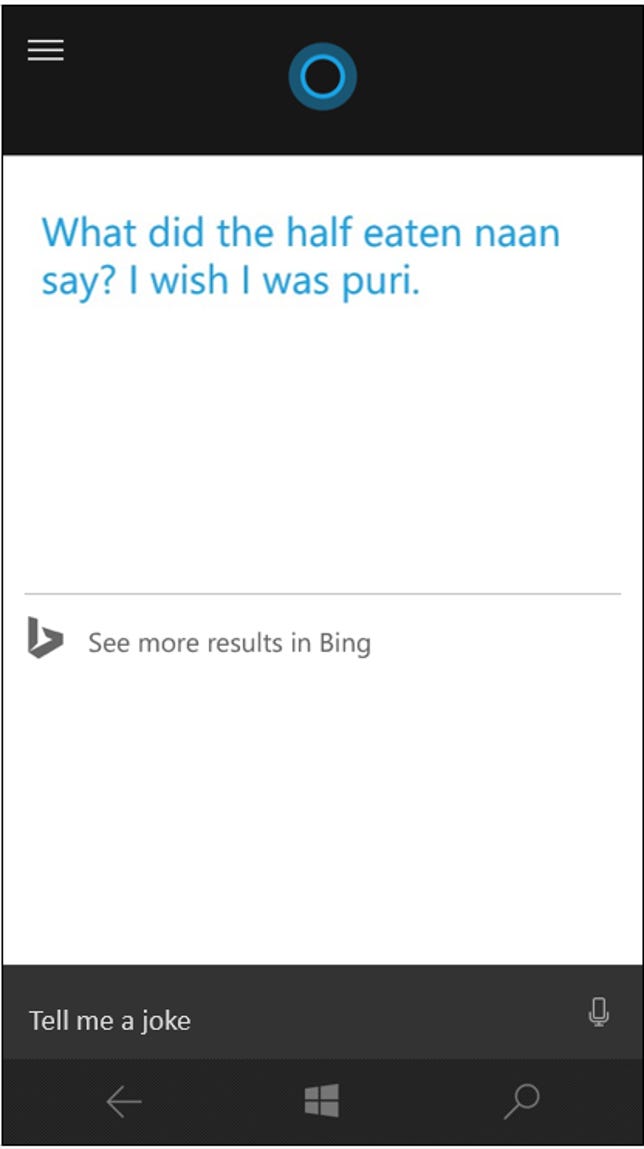
Josh Miller/CNET
We live in a world where we’re starting to talk to our computers, but it still feels like the device on the receiving end is a machine. Microsoft believes it’s begun solving that with Cortana.
The Internet-connected service, which lives inside Microsoft’s new Windows 10 software out Wednesday, will be the first assistant at the beck and call of PC users across the globe. It’s based on the advanced artificial intelligence character in the Microsoft-owned video game saga Halo, but it’s widely available to anyone with the company’s new operating system.
Like Apple’s Siri and Google’s own Google Now service, Cortana lets you interact with a device by talking to it, asking to set reminders, respond to text messages and hear contextual information gleaned from emails and search results, like flight times, sports scores and news headlines.


Microsoft
Microsoft first released a test Cortana for its Windows Phone software in April 2014, but this upgrade will have many more features like its ability to store and remember your personal traits and tailor itself to whatever region you’re using it in, so that Cortana in China feels different than the Cortana in Spain. At launch, Cortana will be available in seven countries, including the US, the UK, China, France, Italy, Germany and Spain, with more countries to come later this year.
Microsoft largely missed the boat on smartphones, where Siri and Google Now dominant the majority of gadgets. Now, the world’s largest software maker hopes Cortana can do the same for PCs and even possibly convert mobile users to its service — Cortana will come to Apple’s iOS and Google’s Android later this year. The company, including co-founder Bill Gates, sees the future of computers as devices that see, understand and interact with the world, and Cortana represents that first step. For now, Cortana is also a way for Microsoft to pull together its various products and services that no longer live exclusively within Windows on the PC. Microsoft software like the Word document editor and Outlook email service are now popular applications for Apple’s iPhone and Android tablets.
“Increasingly, Microsoft wants to use Cortana as the glue that sticks all its different applications together,” said Jan Dawson, an analyst at Jackdaw Research.
The personal data assistant represents in some ways one of the most widely used forms of early artificial intelligence. These software programs are far from smart on the scale of Iron Man’s computerized butler Jarvis or the Scarlett Johansson-version of Cortana in the Spike Jonze film, “Her,” which falls in love and has a relationship with a human male played by Joaquin Phoenix. Yet over the next decade, these assistants are expected to become more powerful — both in their ability to impersonate humans and in the amount of personal data they are able to process and learn from to provide you information you didn’t know you were looking for.
They are the “interim step before we get to full-on robotics and robotic assistants,” said Rob Enderle, an analyst with Enderle Group. “The end game here is to have a voice interface that does everything for you — interfaces with your car, your home, all aspects of your life.”
Unwrap Cortana’s Easter eggs






To do that, however, they can’t just be smarter — they need to be cultured too, especially if they’re going to be used all over the world. And Microsoft’s Cortana, which is powered by the company’s Bing search engine, is a chance to put both Microsoft’s data prowess and its intensive research capabilities to good use.
Microsoft says Cortana will likely be around for decades, getting smarter and more powerful all while collecting information about users in her digital “notebook,” what the company calls a repository of data the service will learn about you, individually, that you can view, edit and delete at any time.
“This is an extremely long-term play for us,” said Susan Hendrick, a product manager on Microsoft’s Cortana team based in Redmond, Washington. “Ten years from now, we’ll be able naturally speak to our technology.”


Microsoft
Microsoft is hoping it has a competitive advantage over Apple and Google, as well as Amazon, which entered the virtual assistant market earlier this year with the Echo speaker powered by its Alexa software. Cortana is poised to pack the powerful computing punch of Google Now with the personal touches of Apple’s Siri.
“Google Now is very capable, but it’s very cold,” Enderle said.”Siri, even though it’s not very capable, comes across as your buddy.”
If Cortana can comfortably be both smart and personable at the same time, it may supersede competitors and become the de-facto gold standard of personal virtual assistants.
Hendrick said Microsoft is achieving this balance by having teams around the world work on Cortana’s software. There are language specialists, playwrights, sociologists, comedians and entertainment writers in each respective country Cortana is launching in, and they’ve all been asked to make Cortana feel as homegrown as possible in every part of the world in which it’s available.
In China, for instance, Cortana comes across as something akin to a big sister than most Chinese smartphone owners never had, Hendrick said, and the subtleties are expressed mostly in the tone and pitch of the voice. In the UK, Cortana resembles something more of a cheeky and self-deprecating assistant that nevertheless maintains a formal demeanor. In the US, however, Microsoft wants Cortana to resemble the kind of co-worker you can work well with and still get a drink at the end of the day.
In Italy, Cortana will use variations of the pronoun “we” to tap into Italians’ sense of national pride, and it will even chant the national anthem when asked to sing a song. In Canada, Cortana is a hockey fan; in India, an avid cricket watcher.
These region-specific versions of Cortana are coupled with cultural information and specially tailored vocal styles. In China’s high-pollution environments, Cortana will inform you of the air quality just as it would traffic and weather conditions, while the UK version of the software will employ extra dashes of irony and sarcasm to even everyday exchanges.
More on Windows 10
- How to prepare your PC for Windows 10
- Microsoft rolls out more Windows 10 updates as July 29 launch looms
- When is Windows 10 coming to your favorite PC brand? It’s complicated
- Microsoft rushes emergency security fix for Windows
- Last prerelease Windows 10 tweak triggers crashes for some testers
Though Cortana’s voice was initially based on Jen Taylor, the actress who voiced the character for Microsoft’s Halo games, the research team behind the software sifts through nearly two dozen voice talents to find someone that fits the bill for what the team feels is culturally relevant to the country.
“Software design is changing drastically as we start looking at things like how do people relate to other people, what makes them feel comfortable,” Hendrick said. “What are the aspects of that relationship as it goes from, ‘We don’t know each other at all’ to ‘We’ve been working with each other for a long time.'”
In the next five or so years, Microsoft is focused on expanding Cortana’s ability to understand and communicate natural language so that the software can start doing more on the user’s behalf, especially with third-party applications.
“You’ll be able to say, ‘Netflix, add “The Terminator” to my queue,'” Hendrick said.
In time, Cortana, too, should be able to understand that line as both a request and a subtle joke about machines taking over the world — and even say something witty in return.




